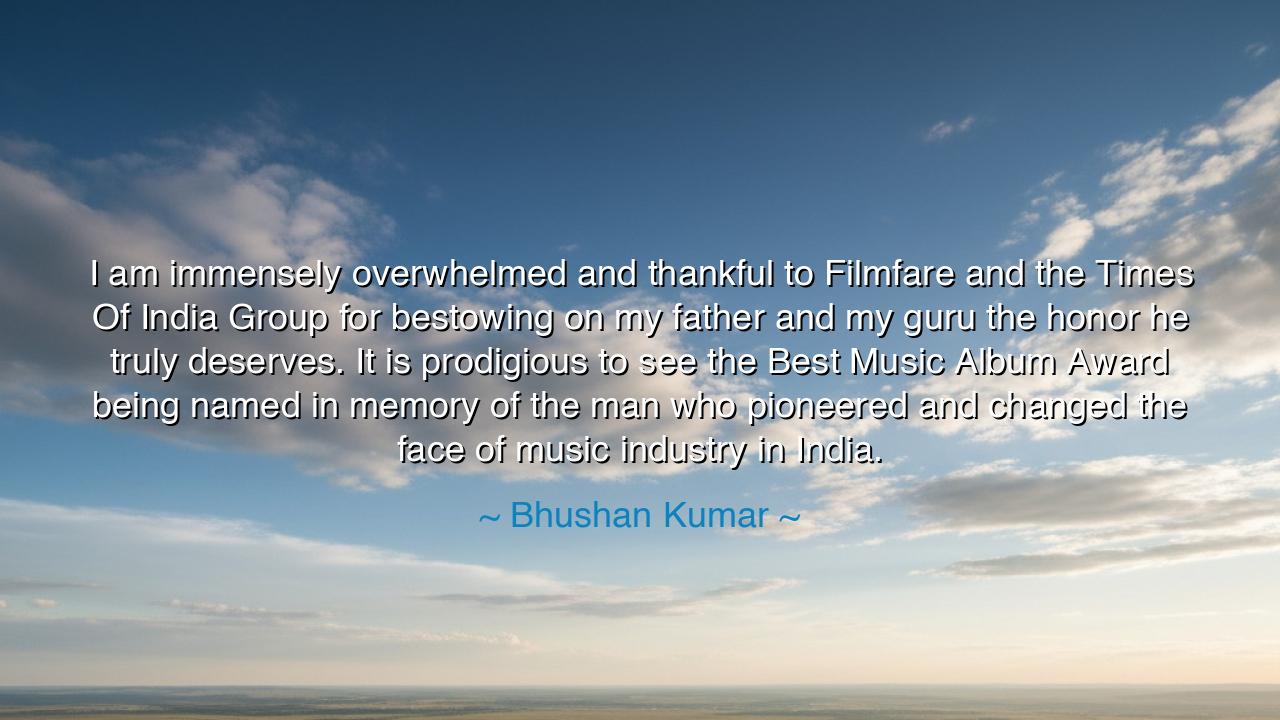
I am immensely overwhelmed and thankful to Filmfare and the
I am immensely overwhelmed and thankful to Filmfare and the Times Of India Group for bestowing on my father and my guru the honor he truly deserves. It is prodigious to see the Best Music Album Award being named in memory of the man who pioneered and changed the face of music industry in India.






Hear the words of Bhushan Kumar, spoken with reverence, pride, and humility: “I am immensely overwhelmed and thankful to Filmfare and the Times of India Group for bestowing on my father and my guru the honor he truly deserves. It is prodigious to see the Best Music Album Award being named in memory of the man who pioneered and changed the face of the music industry in India.” In this declaration lies not only the gratitude of a son, but the timeless song of legacy, remembrance, and the eternal bond between master and disciple, father and child.
The ancients taught us that to honor one’s father is to honor one’s roots, to water the tree of life from which one has sprung. In Greece, the son carried the reputation of the father as both a burden and a blessing, striving to uphold the name passed down. In India, the guru-shishya tradition enshrined the teacher as equal to the divine, the one who opens the eyes of the disciple to knowledge and truth. Bhushan Kumar, by calling his father both “father” and “guru,” reveals the double role his parent played—blood that gave him life and wisdom that gave him purpose.
Consider the story of Ashoka the Great, who, after waging wars of conquest, remembered the teachings of his father and turned his heart toward dharma, becoming one of India’s greatest patrons of peace. The son’s reverence for the father’s legacy transformed empires. Likewise, Bhushan Kumar’s words remind us that the works of a father do not perish when the man passes, but live on when carried in the hearts of children who honor them. The naming of an award after his father is not simply a tribute—it is the planting of memory into the future, ensuring that generations yet unborn will know the name of the one who “pioneered and changed the face of the music industry.”
In calling the moment “immensely overwhelming”, Bhushan Kumar reveals that gratitude is not cold acknowledgment but an emotional tide that humbles the soul. To see a father’s labor recognized by the world is to witness justice made visible. For too often, the pioneers labor in shadows, misunderstood in their own age, their genius only recognized when others build upon it. To witness such recognition in his father’s name is to stand at the meeting of past and present, where memory becomes immortality.
The words also exalt the power of institutions—Filmfare, the Times of India Group—who carry the authority to shape cultural remembrance. Just as the poets of Homer kept alive the memory of fallen warriors, or the chroniclers of Rome preserved the names of emperors and generals, so too do modern institutions preserve the legacy of pioneers. By naming the Best Music Album Award after his father, they transform his story into an everlasting monument, reminding us that memory is strongest when it is made communal, when the greatness of one life becomes a beacon for many.
The lesson here is timeless: honor those who came before you, for in their labor your own foundation is built. Be thankful for the teachers and parents who shaped you, for without them your path would be dark. When their deeds are recognized, do not merely accept it as ceremony but embrace it as sacred justice, a reminder that legacy is not erased by time, but magnified when carried forward with reverence.
Practical wisdom follows: speak often of those who inspired you, whether they be family, teachers, or mentors. Let their names live on your lips, for remembrance is the truest form of immortality. When you achieve success, do not forget to tie it to the roots from which you grew. And if you are entrusted with influence, use it to lift the memory of others, just as this award lifted the name of Bhushan Kumar’s father.
Thus, his words rise not only as a son’s gratitude, but as a teaching for all: “I am immensely overwhelmed and thankful… it is prodigious to see honor bestowed on the man who pioneered and changed the face of music.” This is the eternal creed: be thankful, honor your fathers and gurus, preserve their legacy, and in doing so, you will change the face of the future as they once changed the face of the past.






AAdministratorAdministrator
Welcome, honored guests. Please leave a comment, we will respond soon